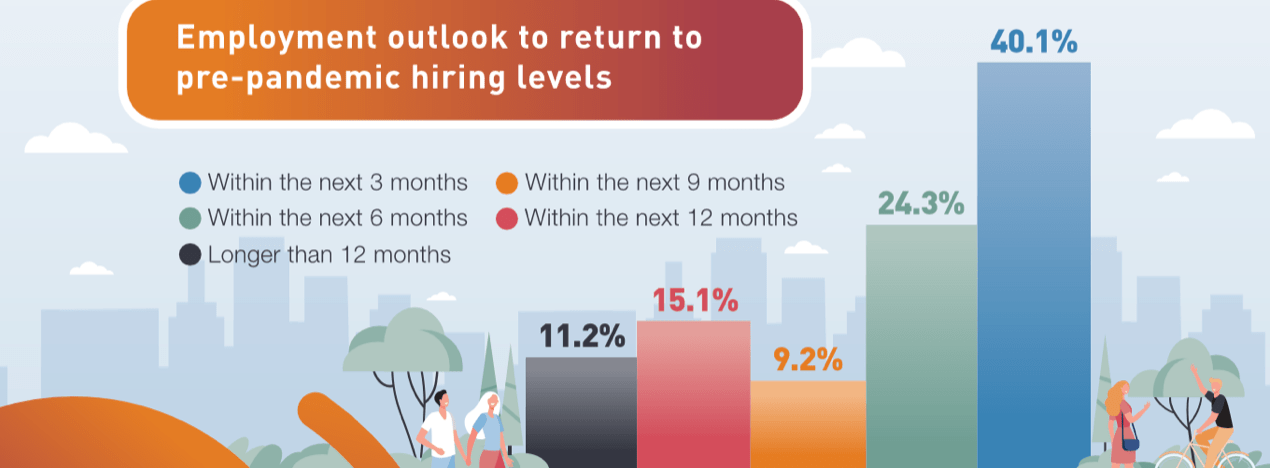Vietnam’s fourth outbreak, the longest and most serious wave since the beginning of the COVID-19 pandemic, has brought lives to a standstill. Mobility restrictions in Ho Chi Minh City, Hanoi, Binh Duong and in many other major cities have been extended numerous times, and there’s no telling how long these social distancing measures will last, given the severity of the situation.
These movement controls have also forced nearly all businesses in hard-hit cities to temporarily suspend operations or completely shut down. According to the Ministry of Labour, Invalids and Social Affairs, in the second quarter of 2021, about 12.8 million people aged 15 and above were negatively impacted by the pandemic, many of them have lost their jobs, got furloughed, worked alternate shifts or at reduced working hours and income.
A new survey conducted by ManpowerGroup Vietnam, a workforce solutions company, showed that over 40% of the employers reported that their businesses were impacted by the pandemic at mild to medium level (1%-49% of activity halted), 19% were significantly affected (50%-79% of activity halted) and 4% said that their organizations had been shut down or faced possible closures.
The Vietnam Employment Outlook Survey, conducted from mid-May to mid-July, mostly comprised small and medium-sized enterprises (SMEs) with 10-250 employees. The respondents were from businesses operating in 17 industries, including manufacturing and processing, wholesale, retail and trading, construction, information and communication technology as well as in hospitality and real estate.
The number of businesses affected by the pandemic from mild to severe level accounted for nearly 64% of those surveyed, while those remained unaffected and highly resilient to the impacts of the fourth wave made up for 36%.
“Despite the much heavier impacts of the health crisis as compared with the first half of 2021, these findings have shown the efforts and determination of the entire economy as well as the Government’s companionship and direction via various policies in anti-epidemic, business support and promoting economic growth,” reads the ManpowerGroup report.
The fourth outbreak, which started on April 27 and continues to worsen by the day, has certainly taken a toll on Vietnam’s socio-economic development at a larger and more serious scale than any other recent economic setbacks.
Even so, a separate report from the General Statistics Office showed that Vietnam’s GDP in the first six months of 2021 increased by 5.64%, higher than the growth rate of 1.82% in the same period last year. Manufacturing and processing sector remains the key driver of the whole economy at a growth of 11.42%, contributing 2.9% to the economic growth rate.
With the economy showing resilient growth amidst a devastating health crisis, most Vietnamese employers remain positive in the resumption of their operations and in eventually growing employment.
As a matter of fact, ManpowerGroup’s survey found that more than 40% of the employers expect that their hiring activities would recover in the next three months, and over 24% of enterprises anticipate employment to return to normal in the next six months. About 11% of the respondents believe it would take longer than 12 months for their operations and hiring activities to fully resume.

“We are noticing an increase in permanent recruitment and executive search, especially in IT, electronics, energy and high technology. Given that the labor market is facing skills scarcity, senior IT and business transformation roles are particularly hard to fill. Moreover, under the global impact of the pandemic and technological evolution, the job market is seeing a boost in demand for positions that require digital skills, such as those in the finance and banking sector,” said Nguyen Thu Trang, Country Head of Permanent Recruitment and Executive Search at ManpowerGroup Vietnam.
The survey also showed that more than half (53%) of the employers anticipate a rise in their employment, while about 27% said they had no plan to hire more. In total, more than 80% of the surveyed enterprises plan to increase or at least maintain the current headcounts. Only a fifth of the respondents announced their plan to trim hiring activities.
Sectors with most positive outlook
Strongest recruitment plans in the next three to six months were reported in six key industries: manufacturing and processing, wholesale, retail and trading, information and communication technology, education and training, construction and professional consulting services.
The manufacturing industry alone accounts for 26.5% of hiring intentions within the next three months; while wholesale, retail and trading and ICT are also likely to grow stronger, making up for 16.3% and 15.3% respectively of employers planning to hire in the short term.

“Since the beginning of the pandemic, the domestic labor market has been witnessing an increase in the relocation of factories from overseas to Vietnam,” said Le Thi Kim, Head of Staffing at ManpowerGroup Vietnam. As global brands shift their operations in low-labor-cost Vietnam, this gives rise to more job opportunities for the local workforce.
Hybrid work model most preferred by employers
With the uncertainty of the situation in Vietnam, most of the employers surveyed said a hybrid working model is the best solution to keep operations stable, at least in the next three to six months. Over 40% said offering workers flexibility will ensure that both employees and the company remain safe and effective.
About one-fourth of the enterprises, however, want to retain an absolute workplace-based model, and nearly 22% choose to apply flexible shift patterns — this is more notably seen in the manufacturing sector, where production is non-stop. Just nearly 9% of the surveyed companies intend to arrange for their employees to work remotely full-time. More than 3% are unsure, and are still waiting to see how the situation evolves in the coming months.
